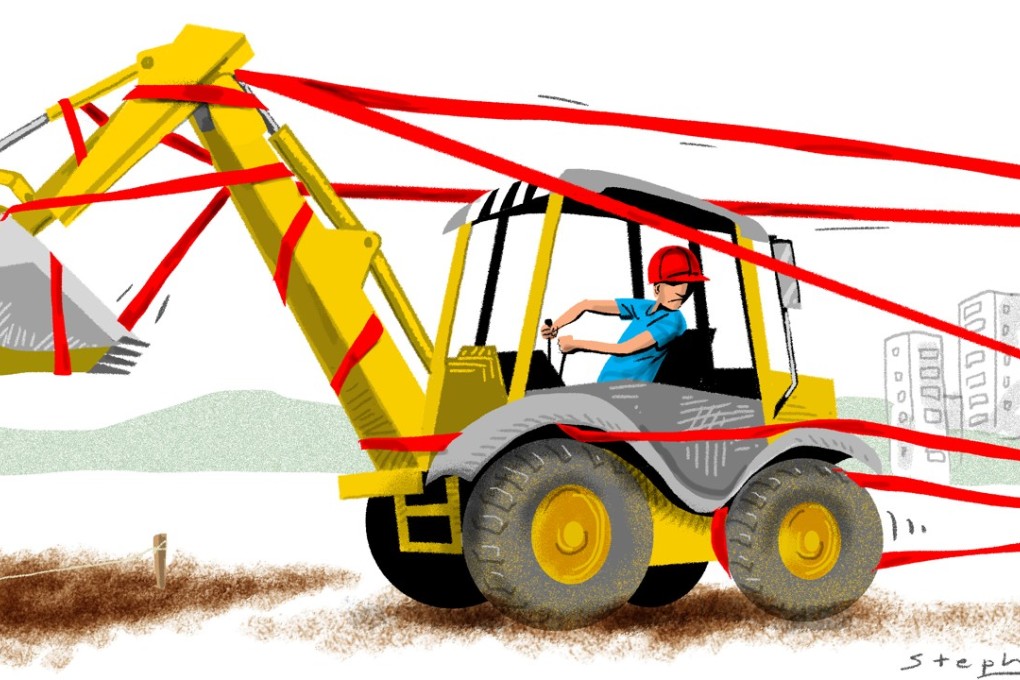Advertisement
Don’t blame developers for Hong Kong’s land ‘shortage’ – government policies are the real problem
Ian Brownlee says the government’s policy of buying back land in the New Territories, rather than allowing private owners to participate in the development of new towns, is contributing to the delay in freeing up land for housing
Reading Time:4 minutes
Why you can trust SCMP

Developers are often criticised for hoarding land in the New Territories and not developing their plots to meet Hong Kong’s housing shortage. Nothing could be further from the truth. Developers want to develop; that is their reason for being.
Advertisement
Instead, the biggest problem is that the government puts obstacles in the way of them doing this. Why this happens is mystifying to those of us involved in the development process, as it is the government that keeps saying land for development is desperately needed.
The private land in the New Territories is largely designated as agricultural land under the leases and zoned for non-development purposes – such as agriculture or open storage. Some of this land is privately owned by villagers, small businesses and families. Much of the land has been bought by developers as land banks for future projects. This is a reasonable strategy based on the historical approach taken by the government of rezoning land for development, then negotiating new leases with the existing land owner and requiring payment of substantial land premiums.
Up to 350,000 people could live in one of Hong Kong’s last untouched areas, study finds
In the past five years, I have made representations to the Town Planning Board on behalf of many land owners which would have produced more than 50,000 additional flats. These have been in reasonable locations with good access to public services and facilities, are compatible with the future planning of the area and meet policy objectives. Not one of these proposals has been accepted. Almost all proposals for new development on private land or for increased flat production on private land have been rejected.
It is almost as if a development possibility not initiated by the government is automatically rejected
The government has focused on rezoning government land for housing. As a result, many areas of the green belt, created to safeguard the natural environment from urban encroachment, have been rezoned. When private sector proposals are made on private land, they are inevitably rejected. It is almost as if a development possibility not initiated by the government is automatically rejected.
Where significant areas of private land have been rezoned by government for the new town development in Hung Shui Kiu, the government has put in place obstacles to the land exchange process which prevent owners from developing their land. Hung Shui Kiu covers 441 hectares, of which 324 hectares is private land. Within this are some 190 hectares of brownfield sites (damaged agricultural land), some of it used as container storage. Much of this land has been rezoned for housing, commercial development and community facilities. The Town Planning Board is yet to announce its decisions on public objections, many of which relate to private land ownership.
Five Hong Kong villages to go to make way for Hung Shui Kiu new town
‘Careless’ task force slammed for neglecting land that could hold 84,000 flats in Hong Kong
In a Legislative Council paper in 2017, the administration adopted the “Enhanced Conventional New Town approach” stating that “the government will as a general rule resume and clear all of the private land planned for development and dispose of the land planned for private developments in the market”. Therefore, almost all of the private land owners will face compulsory purchase, lose their ownership rights and not be able to participate in the development of the new town.

Advertisement